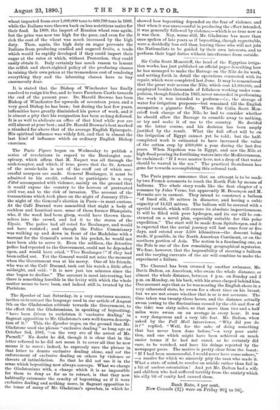The Paris Figaro began on Wednesday to publish a series
of revelations in regard to the Boulangist con- spiracy, which affirm that M. Naquet was all through the arch-tempter, and which, if true, prove that the St. Arnaud of the music-halls is not of the stuff out of which suc- cessful usurpers are made. General Boulanger, it must be admitted to his credit, refused to participate in a coup d'etat accompanied with violence, mainly on the ground that it would expose the country to the horrors of protracted civil war, and to the risk of invasion. The account of the transactions which took place on the night of January 27th— the night of the General's election in Paris—is most curious. At the Cafe Durand were assembled that night a body of reckless and fanatical men, some of them former Blanquists, who, if the word had been given, would have thrown them- selves into the crowd, and led it to the storm of the Elysee. The police had all voted for Boulanger, and would not have resisted ; and though the Police Commissary was walking up and down in front of the Madeleine with a warrant for the General's arrest in his pocket, he would not have been able to serve it. Even the soldiers, the detective police had reported to the Government, could not be depended upon, and would have cried, " Vive Boulanger !" if they had been called out. Yet the General would not seize the moment when the Government was at his mercy. One of his friends, who was at the Cafe Durand, took out his watch a little after midnight, and said : "It is now just ten minutes since the star began to decline." The account is most interesting, but there is something horrible in the levity with which the whole matter seems to have been, and indeed still is, treated by the Parisians.


































 Previous page
Previous page